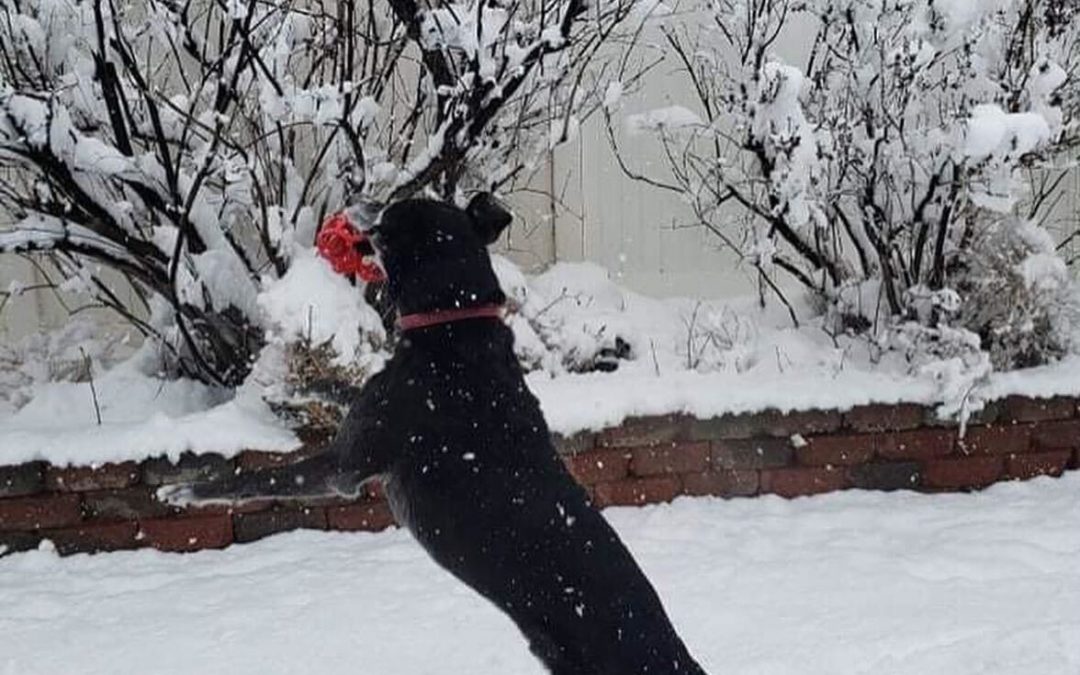Cold Weather Reminders
We’ve reached the bitter cold of Minnesota winter, so it’s a good time to remember a few safety guidelines:
- Protect those paws! Paw pads are tough, but very cold temperatures can cause frostbite. In the city, paws also have to contend with salt, sand, and other irritants that can harm the sensitive skin between toes. Boots and paw wax are helpful at preventing paw irritation.
- Shovel a potty patch: Urinating or defecating directly into a deep pile of snow can lead to frostbite on some very sensitive body parts. To prevent this, shovel out a small patch in the yard for your dog to go potty, especially when temperatures drop below zero.
- Consider a coat: Some dog breeds are built for cold weather and don’t need any help staying warm. Dogs with thin fur, a lean body type (like greyhounds), or dogs who are very young or very old can all benefit from the extra insulation provided by a coat.
- Monitor the windchill: Dogs’ most sensitive extremities (such as their nose, the tips of their ears, and their tails) are more likely to become frostbitten when it’s windy. Even if air temperature is relatively warm, keep an eye on the windchill and keep walks shorter when the windchills are in dangerous ranges.
- Provide a dry, draft-free space: Some pets love to be outside no matter how chilly it gets. But even if your Bernese Mountain Dog would rather be sleeping in a snowbank than in a cozy bed by the fire, make sure he has access to somewhere dry and outside of the wind. Cold becomes more dangerous when animals get wet and unable to get out of the wind.
- Keep small animals away from drafty windows: Small mammals (such as rats, rabbits, and guinea pigs) and pet birds are especially sensitive to cold. Stress from being in drafty areas can lead to respiratory infections. Make sure that enclosures are kept in a warm, draft-free part of the house.
- Chemicals: Winter means that certain lethal chemicals, such as antifreeze and mouse/rat poisons, are more likely to be nearby. Be sure that these are kept well out of reach of pets.
Vote For Us!
Today (Tuesday January 31st) is the final day to vote for us as your favorite vet clinic in the Minnesota Women’s Press Readers Recommend contest! We would love to have your support. You can vote for us here: https://www.surveymonkey.com/r/3TXQD9W
Common Puppy Pitfalls
Veterinarians are often the first people that get to interact with your new puppy, and we get to see what new puppy owners commonly struggle with as they travel through puppyhood. Here are a few of the common pitfalls of puppy ownership and how to avoid them:
- Not making plans for socialization. Socialization is the process of introducing your puppy to all the things she should expect to encounter in life. The window for socialization is short and only lasts from about 8 weeks to 16 weeks of age. Puppies should meet many (healthy, friendly) dogs, as well as range of people (from babies to geriatric people), animals, vehicles, sounds, and smells within this window. Consider the time and effort necessary to properly socialize a puppy, and time your puppy’s adoption when you can accommodate this extra work. Getting a puppy just before the holidays, for example, can make socialization a real challenge, and puppies can’t put their socialization window on hold until your schedule allows for it. Poor socialization is a major cause of anxiety and fear-based behaviors in dogs, and one of the major causes of dogs getting rehomed due to behavior problems.
- Waiting until a puppy is fully vaccinated before bringing him out of the house. Some puppy owners, cautious about exposing their puppies to infectious diseases like parvovirus, choose to keep their puppies away from other dogs until they are fully vaccinated. Because puppies aren’t fully vaccinated until 16 weeks of age, you can see that this approach misses the socialization window completely. I recommend starting vaccines around 8 weeks of age and avoiding areas where lots of dogs congregate and encourage puppy owners to have their puppies play with healthy, dog-friendly dogs as soon as they’ve had their first distemper/parvovirus vaccine.
- Hoping that puppies “grow out of” bad behaviors. Nipping, jumping up, barking, and whining are all very normal behaviors for puppies. However, even as young as 8 weeks of age, puppies can start learning which behaviors are appropriate and which are not. Politeness doesn’t come from growing up, it comes from training!
- Believing that a puppy is parasite-free because he was dewormed by his breeder or the shelter. Parasites such as roundworms are extremely common in puppies, and due to the life cycle of parasites, it usually takes a few rounds of deworming to completely clear them of these infections. All new puppies should have a stool sample examined to ensure they are truly parasite-free- especially because some of these parasites can be spread to humans.

Employee Spotlight
Our employee spotlight this month is Mya Ronchak. Mya joined St.Francis in early 2020 as a veterinary assistant. Prior to becoming a veterinary assistant, she was an exotic zookeeper working for a privately owned zoo. She is originally from Hibbing, MN and now lives in Forest Lake, MN. I has a deep love and passion for husbandry of all animals and giving them the best life possible. Nothing is more rewarding to her than a healthy happy animal!
What is your favorite aspect of veterinary medicine?
My favorite aspect of veterinary medicine is being able to provide care at such a professional level that we get to see improvements and results right away. Seeing a pet that is clearly in pain and being able to provide relief and support for them is everything. The wide range of what we see in the clinic/hospital also amazes me at just how much we are able to do in the veterinary field.
What do you think is special about St. Francis? Why do you love working here?
Our team! We are such a close group that we dorkily call ourselves “wamily” (work family). Our team is truly fantastic and we all work very well together. Another thing that is very special about St. Francis is our clients. I really do feel like we have a special bond with almost all of our clients and I don’t feel like you get that everywhere.
I love working here because of the level of quality care we provide even for being in such a small building. We truly do go above and beyond for our patients and provide top level care from diagnostics to client education to specialty surgeries. I also love that we are constantly changing things and evolving our clinic striving for top notch veterinary medicine.

